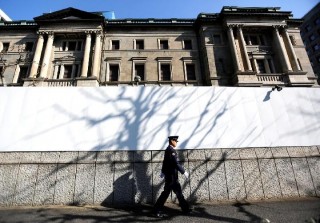Loading
Search
▼ Bank of Japan Keeps Ultra-low Interest Rates
- Category:Other
The Bank of Japan kept ultra-low interest rates on Friday, Oct. 28, and maintained its dovish guidance, cementing its status as an outlier among global central banks tightening monetary policy, as recession fears dampen prospects for a solid recovery.
But the central bank revised up its price forecasts through 2024 and warned that risks were skewed to the upside, nodding to recent signs that inflationary pressure was broadening.
"The labor market will continue to tighten and gradually strengthen wage pressure," the BOJ said in a quarterly report.
"Accelerating underlying inflation is expected to heighten medium- and long-term inflation expectations ... and lead to sustained price rises accompanied by wage gains," it said.
As widely expected, the BOJ left unchanged its -0.1% target for short-term interest rates and a pledge to guide the 10-year bond yield around 0%.
The central bank also maintained its dovish guidance projecting that short- and long-term rates will remain at "present or lower levels."
The yen fell about 0.4% to a session low of 146.90 per dollar in the aftermath of the central bank's decision but later reversed the losses to eke out a marginal gain. It last stood 0.13% higher at 146.10 per dollar.
Japan's benchmark 10-year bond yield fell to its lowest level in nearly four weeks after the BOJ's decision to stand pat on policy.
"The BOJ will continue to lag behind the United States and Europe in tightening monetary policy," said Kyohei Morita, chief economist at Nomura Securities.
"In fact, it won't be able to raise rates at least until the fiscal year beginning in April 2024, given that the pace and extent of inflation both undershoot those of western economies."
In fresh projections, the BOJ revised up its core consumer inflation forecast to 2.9% for the year ending in March 2023, from a 2.3% estimate made in July and exceeding its 2% target.
It also upgraded its inflation forecasts to 1.6% for both fiscal 2023 and 2024, nodding to recent signs that companies are actively passing on rising raw material costs to households.
In a sign of its concern over global recession fears, however, the BOJ cut its economic growth forecasts for fiscal 2022 and 2023.
The announcement came in the wake of the European Central Bank's decision to raise interest rates again on Thursday, continuing its efforts to prevent rapid price growth from becoming entrenched. The U.S. Federal Reserve is also expected to hike rates next week.
While more modest than other major economies, Japan's core consumer inflation hit an eight-year high of 3% in September, exceeding the BOJ's 2% target for six straight months.
The BOJ's ultra-easy policy has helped trigger sharp yen declines that inflate the cost of importing already expensive fuel and raw materials, prompting the government to intervene in the market to prop up the currency.
But the central bank revised up its price forecasts through 2024 and warned that risks were skewed to the upside, nodding to recent signs that inflationary pressure was broadening.
"The labor market will continue to tighten and gradually strengthen wage pressure," the BOJ said in a quarterly report.
"Accelerating underlying inflation is expected to heighten medium- and long-term inflation expectations ... and lead to sustained price rises accompanied by wage gains," it said.
As widely expected, the BOJ left unchanged its -0.1% target for short-term interest rates and a pledge to guide the 10-year bond yield around 0%.
The central bank also maintained its dovish guidance projecting that short- and long-term rates will remain at "present or lower levels."
The yen fell about 0.4% to a session low of 146.90 per dollar in the aftermath of the central bank's decision but later reversed the losses to eke out a marginal gain. It last stood 0.13% higher at 146.10 per dollar.
Japan's benchmark 10-year bond yield fell to its lowest level in nearly four weeks after the BOJ's decision to stand pat on policy.
"The BOJ will continue to lag behind the United States and Europe in tightening monetary policy," said Kyohei Morita, chief economist at Nomura Securities.
"In fact, it won't be able to raise rates at least until the fiscal year beginning in April 2024, given that the pace and extent of inflation both undershoot those of western economies."
In fresh projections, the BOJ revised up its core consumer inflation forecast to 2.9% for the year ending in March 2023, from a 2.3% estimate made in July and exceeding its 2% target.
It also upgraded its inflation forecasts to 1.6% for both fiscal 2023 and 2024, nodding to recent signs that companies are actively passing on rising raw material costs to households.
In a sign of its concern over global recession fears, however, the BOJ cut its economic growth forecasts for fiscal 2022 and 2023.
The announcement came in the wake of the European Central Bank's decision to raise interest rates again on Thursday, continuing its efforts to prevent rapid price growth from becoming entrenched. The U.S. Federal Reserve is also expected to hike rates next week.
While more modest than other major economies, Japan's core consumer inflation hit an eight-year high of 3% in September, exceeding the BOJ's 2% target for six straight months.
The BOJ's ultra-easy policy has helped trigger sharp yen declines that inflate the cost of importing already expensive fuel and raw materials, prompting the government to intervene in the market to prop up the currency.
- October 28, 2022
- Comment (0)
- Trackback(0)


